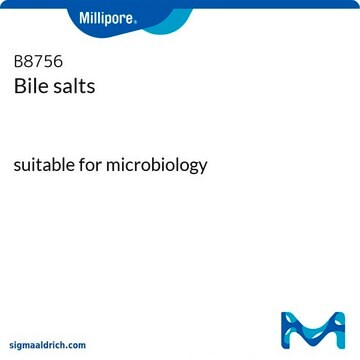207861
Ammonium carbonate
ACS reagent, ≥30.0% NH3 basis
Synonym(s):
Hartshorn salt
About This Item
Recommended Products
grade
ACS reagent
Quality Level
vapor density
2.7 (vs air)
description
Mixture of variable proportions of ammonium bicarbonate and ammonium carbamate
form
powder or chunks
concentration
≥30.0% NH3
impurities
≤0.005% insolubles
≤0.01 nonvolatiles
anion traces
chloride (Cl-): ≤5 ppm
sulfate (SO42-): ≤0.002%
cation traces
Fe: ≤5 ppm
heavy metals: ≤5 ppm (by ICP-OES)
SMILES string
N.N.OC(O)=O
InChI
1S/CH2O3.2H3N/c2-1(3)4;;/h(H2,2,3,4);2*1H3
InChI key
PRKQVKDSMLBJBJ-UHFFFAOYSA-N
Looking for similar products? Visit Product Comparison Guide
Related Categories
General description
Application
- Preparation of 3,4-dihydropyrimidin-2(1H)-one and 1,4-dihydropyridine derivatives, via Biginelli and Hantzsch reactions.
- Preparation of ammonium carbonate buffer.
- Synthesis of dihyropyridones derivatives.
Storage Class Code
11 - Combustible Solids
WGK
WGK 1
Flash Point(F)
Not applicable
Flash Point(C)
Not applicable
Regulatory Listings
Regulatory Listings are mainly provided for chemical products. Only limited information can be provided here for non-chemical products. No entry means none of the components are listed. It is the user’s obligation to ensure the safe and legal use of the product.
JAN Code
207861-500G:4548173216782
207861-2.5KG:4548173216799
207861-25G:4548173216775
207861-VAR-D:
207861-BULK:
207861-1KG:
207861-100G:
207861-VAR:
Certificates of Analysis (COA)
Search for Certificates of Analysis (COA) by entering the products Lot/Batch Number. Lot and Batch Numbers can be found on a product’s label following the words ‘Lot’ or ‘Batch’.
Already Own This Product?
Find documentation for the products that you have recently purchased in the Document Library.
Our team of scientists has experience in all areas of research including Life Science, Material Science, Chemical Synthesis, Chromatography, Analytical and many others.
Contact Technical Service





